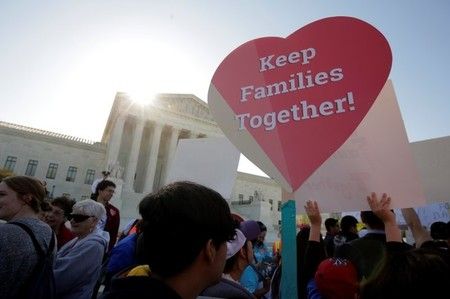Advertisement
Immigration, abortion, race rulings due at Supreme Court

WASHINGTON (Reuters) – The U.S. Supreme Court is heading into its home stretch, with major rulings due by the end of the month on President Barack Obama’s unilateral immigration plan, racial preferences in university admissions and a restrictive Texas abortion law.
Producing decisive rulings has been complicated by the fact that the court has been down one justice since conservative Antonin Scalia died in February, leaving it evenly split with four conservatives and four liberals.
The justices also are set to rule on whether to overturn Republican former Virginia governor Robert McDonnell’s 2014 corruption conviction, one of the 13 cases yet to be decided.
The court appeared divided along ideological lines when it heard arguments on April 18 over whether Democrat Obama exceeded his constitutional powers in bypassing the Republican-led Congress with a 2014 plan to spare millions of immigrants in the country illegally from deportation and give them work permits.
Twenty-six states led by Republican-governed Texas brought the lawsuit. A 4-4 ruling, which appeared to be one possibility after the arguments, would deal Obama a huge defeat because it would affirm a lower-court ruling invalidating the plan.
Split rulings do not set nationwide legal precedents, but a 4-4 decision would effectively kill Obama’s immigration plan.
The court also seemed split along ideological lines during March 2 arguments in a challenge to a Texas abortion law brought by abortion providers backed by the Obama administration.
A 4-4 ruling would deliver a victory to Texas because it would affirm a lower-court ruling upholding the law. Because such a ruling would set no nationwide precedent, it might not serve as a legal blueprint for other conservative, Republican-dominated states to enact similar laws.
The question before the justices is whether the law, which imposes strict regulations on abortion doctors and clinic facilities, violates a woman’s constitutional right to abortion as established in the 1973 Roe v. Wade ruling.
There cannot be a 4-4 ruling in a challenge by a white woman, enlisted by a conservative legal activist, to a University of Texas student admissions policy giving preferences to racial minorities in a program aimed at fostering campus racial diversity. Only seven justices heard that case.
Liberal Elena Kagan, the Obama administration’s solicitor general when it supported the university in earlier litigation, recused herself. That means four conservatives and three liberals will decide the case. Conservative justices expressed reservations about the affirmative action admissions policy during Dec. 9 arguments.
(Editing by Will Dunham)


